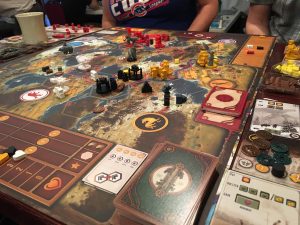The evolution of tabletop games is a fascinating journey that mirrors cultural shifts, technological advancements, and the changing dynamics of social interaction. From the ancient origins of board games to the complex narratives of role-playing games RPGs, the landscape of tabletop gaming has transformed dramatically over the centuries. Early board games, such as Sent in ancient Egypt and Go in China, served not only as entertainment but also as a means of strategy and intellectual challenge. These games laid the groundwork for the board gaming tradition, emphasizing social interaction and cognitive skills. The middle Ages saw the emergence of games like chess, which further developed strategic thinking and became a symbol of intellect and nobility. The industrial revolution marked a significant turning point in the tabletop gaming industry. The mass production of games made them more accessible to the general public, leading to the creation of classics like Monopoly and Scrabble in the early 20th century. These games reflected contemporary social issues and themes, providing players with a means to engage with their realities in a fun and interactive manner.

The rise of family board games during this period also highlighted the growing importance of leisure time and the desire for shared experiences in an increasingly urbanized world. This innovative game shifted the focus from board-centric gameplay to narrative-driven experiences, allowing players to immerse themselves in fantastical worlds and character development. D&D’s success ignited a proliferation of RPGs, each offering unique mechanics, settings, and storylines, thereby fostering a rich tapestry of genres within the tabletop realm. This period also saw the emergence of independent publishers, who began to explore niche markets and alternative gameplay styles, leading to the diversification of tabletop gaming.
As the 21st century approached, the tabletop gaming community witnessed a renaissance fueled by advancements in technology and the internet. The rise of crowdfunding platforms like Kickstarter democratized the creation and distribution of games, allowing small developers to bring innovative ideas to life. This era saw a surge in the popularity of hybrid games that blended traditional board gaming with modern mechanics, such as deck-building and cooperative gameplay. Additionally, the growth of online warhammer store san antonio platforms enabled players to connect with one another across the globe, facilitating virtual tabletop experiences that expanded the gaming community beyond physical boundaries. Today, tabletop games encompass a vast array of genres and styles, appealing to a diverse audience that ranges from casual players to hardcore enthusiasts. The ongoing evolution of tabletop gaming reflects a continual adaptation to cultural trends and technological innovations, ensuring that this beloved pastime remains relevant and engaging. Whether through classic board games that evoke nostalgia or intricate RPGs that foster creativity and collaboration, tabletop gaming continues to thrive as a vital form of entertainment and social interaction, bridging generations and connecting individuals in a shared love for play.
